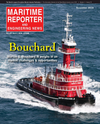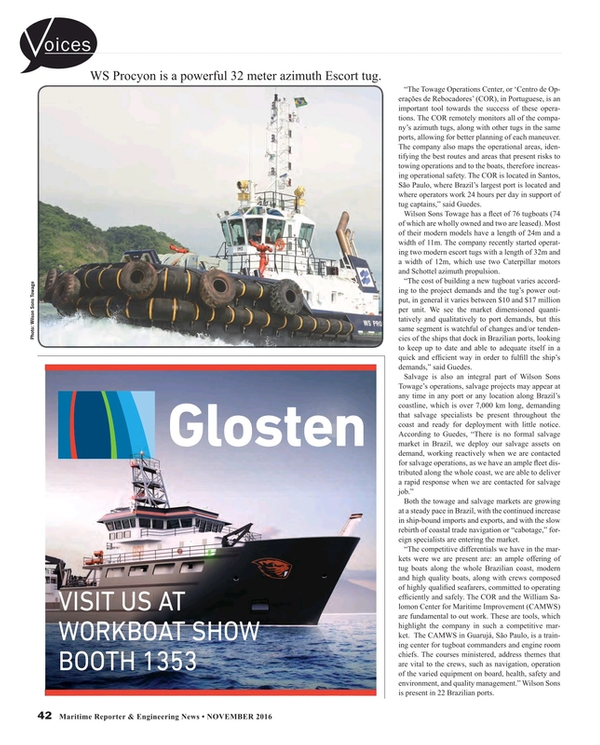
Southern Exposure: Wilson Sons' Sergio Guedes Talks Towage
By Claudio Paschoa
The influx of ships and rigs sailing into and out of Brazilian ports since the discovery of large pre-salt plays off Brazil in 2007, and the opening of new ports and shipyards during the past decade has led to a sharp increase in towing operations in Brazil. MR spoke to Sergio Guedes, Director of Operations at Wilson Sons Towage, about the towage and salvage markets in Brazil.
Wilson Sons Group is one of the largest integrated operators in port and maritime logistics in Brazil. The company has more than a century of experience and is also present in shipbuilding and offshore support services. Its towage fleet is present in ports all along Brazil’s lengthy coast. In Rio, the group has a number of tugboats servicing local ports and shipyards, along with its offshore logistics base, named Brasco, which stores and delivers goods and equipment to offshore rigs and FPSOs with its fleet of PSVs and through third party support vessels.
“Wilson Sons Towage is the market leader in port support in the towage segment in Brazil. The company operates in the main ports along Brazil’s coast and also in three river ports in the northern state of Pará. In 2015 alone, our fleet of tug boats was responsible for 58,000 maneuvers,” said Guedes.
Wilson Sons employs various sizes of modern tugs, many of which use azimuth thrusters for propulsion, allowing them to be more flexible and efficient during port maneuvers and while towing ships offshore. Its operations center works 24/7/365.
“Around 80% of our fleet is composed of tugs with azimuth propulsion. Due to the great variety of operations, the fleet is composed of different types of tugs with bollard pulls, varying from 45 to 85 tons,” said Guedes.
The company’s towage fleet was mostly built at the Wilson Sons shipyard in the state of São Paulo. “Having a shipbuilding unit in the same group is an important competitive differential for Wilson Sons Towage, in that it guarantees us deliveries on time and with excellent product quality.”
Having its own shipyard also permits retrofits, repairs and maintenance to be done in-house, with its inherent advantages. With Brazilian ports at a hectic pace, and with available berths not keeping up to the demands of ship traffic, efficient towage operations are very important to help clear the bottlenecks in some ports, where tankers, container and cargo ships are forced to anchor offshore for a number of days before being allowed to tie-up and offload their cargos.
“Wilson Sons Towage works mainly with port support – during docking and departure of ships in Brazilian ports. On top of that, the tugs will sometime undertake special operations, such as platform movement, FPSO towage, along with offshore towage of different sized ships, and also offshore and inshore salvage operations. Some of our boats are also fitted out with Fire Fighting 1 systems, which permits the company to help combat fires aboard ships and in port installations, when necessary,” said Guedes.
A Towage Operations Center is a relatively new concept in Brazilian ports. Many of the older local ports and towage services were operated in obsolete and inefficient manners, some still are. It is significant to note that Brazilian ports moved 316.7 million tons of merchandise in the first quarter of 2016, a volume 2.52% higher than during the same period in 2015, even with the ongoing Petrobras crisis and government woes.
“The Towage Operations Center, or ‘Centro de Operações de Rebocadores’ (COR), in Portuguese, is an important tool towards the success of these operations. The COR remotely monitors all of the company’s azimuth tugs, along with other tugs in the same ports, allowing for better planning of each maneuver. The company also maps the operational areas, identifying the best routes and areas that present risks to towing operations and to the boats, therefore increasing operational safety. The COR is located in Santos, São Paulo, where Brazil’s largest port is located and where operators work 24 hours per day in support of tug captains,” said Guedes.
Wilson Sons Towage has a fleet of 76 tugboats (74 of which are wholly owned and two are leased). Most of their modern models have a length of 24m and a width of 11m. The company recently started operating two modern escort tugs with a length of 32m and a width of 12m, which use two Caterpillar motors and Schottel azimuth propulsion.
“The cost of building a new tugboat varies according to the project demands and the tug’s power output, in general it varies between $10 and $17 million per unit. We see the market dimensioned quantitatively and qualitatively to port demands, but this same segment is watchful of changes and/or tendencies of the ships that dock in Brazilian ports, looking to keep up to date and able to adequate itself in a quick and efficient way in order to fulfill the ship’s demands,” said Guedes.
Salvage is also an integral part of Wilson Sons Towage’s operations, salvage projects may appear at any time in any port or any location along Brazil’s coastline, which is over 7,000 km long, demanding that salvage specialists be present throughout the coast and ready for deployment with little notice. According to Guedes, “There is no formal salvage market in Brazil, we deploy our salvage assets on demand, working reactively when we are contacted for salvage operations, as we have an ample fleet distributed along the whole coast, we are able to deliver a rapid response when we are contacted for salvage job.”
Both the towage and salvage markets are growing at a steady pace in Brazil, with the continued increase in ship-bound imports and exports, and with the slow rebirth of coastal trade navigation or “cabotage,” foreign specialists are entering the market.
“The competitive differentials we have in the markets were we are present are: an ample offering of tug boats along the whole Brazilian coast, modern and high quality boats, along with crews composed of highly qualified seafarers, committed to operating efficiently and safely. The COR and the William Salomon Center for Maritime Improvement (CAMWS) are fundamental to out work. These are tools, which highlight the company in such a competitive market. The CAMWS in Guarujá, São Paulo, is a training center for tugboat commanders and engine room chiefs. The courses ministered, address themes that are vital to the crews, such as navigation, operation of the varied equipment on board, health, safety and environment, and quality management.” Wilson Sons is present in 22 Brazilian ports.
(As published in the November 2016 edition of Maritime Reporter & Engineering News)
Read Southern Exposure: Wilson Sons' Sergio Guedes Talks Towage in Pdf, Flash or Html5 edition of November 2016 Maritime Reporter
Other stories from November 2016 issue
Content
- America Needs Icebreakers page: 10
- Could Offshore Crewing Requirements Make Things Worse? page: 16
- The Training Implications of Subchapter M page: 19
- Forrest Lucas: The 'Every Man' Tycoon page: 24
- Talking Dutch Designs with Damen’s Peter Robert page: 30
- Ken Konrad: A Driven Innovator page: 36
- Southern Exposure: Wilson Sons' Sergio Guedes Talks Towage page: 42
- Fuel Talk: Greener Ships 'Abandoned' page: 44
- Innovation in Offshore Transfer of LNG page: 48
- R.W. Fernstrum: Keeping Things Cool for 67 Years page: 54
- Interview: Morton S. Bouchard III Pulls No Punches page: 58
- ‘The Best Kept Secret in Shipbuilding’ page: 64
- Crowley's Petroleum Transport Unit Takes the Long View page: 70
- Arpoador Shipyard and Pre-salt FSVs page: 78


